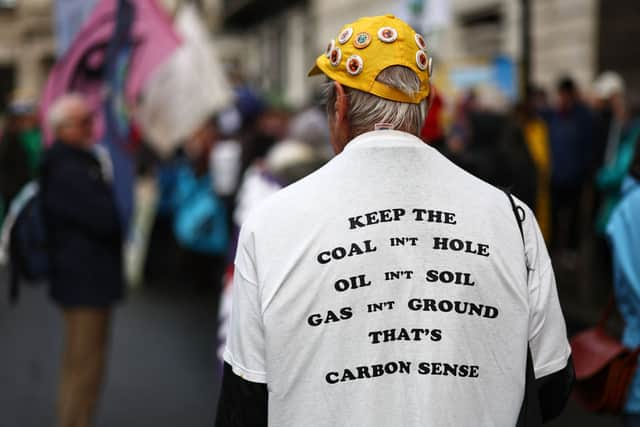Net Zero: The government says the UK has halved its emissions since the 1990s - here's what the experts say
and live on Freeview channel 276
The government says the UK has hit a huge milestone in cutting its greenhouse gas emissions, but scientists have raised concerns about both its accounting methods and its sense of urgency.
This week, the Department for Energy Security and Net Zero released finalised statistics claiming the UK is the first major economy in the world to halve its emissions between 1990 and 2022 - cutting them by 50% over this period - while also growing the economy by nearly 80%. The department also said the UK had "over-achieved" on its third carbon budget.
Advertisement
Hide AdAdvertisement
Hide AdThe government said the data showed the UK was making significant progress towards its net zero greenhouse gas emissions by 2050 target, which is aimed at helping curb some of the most serious impacts of climate change.
Last year was the world's warmest year on record, which saw climate records "tumble like dominoes". Scientists already fear 2024 could be even hotter, and have been urging world government to clamp down on carbon emissions - particularly those created by burning fossil fuels - while there is still time to limit warming, with an average of 1.5C about pre-industrial temperatures considered to be an important tipping point.
In its statement, the government said the UK was "over-delivering" on its commitment to reduce emissions, comparing its reduction of 50% to a 23% reduction in France, and no change in the USA between 1990 and 2021. With renewables now accounting for more than 40% of the country’s electricity – up from just 7% in 2010, this showed the UK was leading the way on cleaner energy, the department said in a statement.


It largely attributed the reductions to cutting emissions from energy generation through the shift away from using coal to using renewables. In 2012, coal provided almost 40% of UK electricity, but later this year, this number is slated to reach zero.
Advertisement
Hide AdAdvertisement
Hide AdEnergy Security Secretary Claire Coutinho said: "The UK is the first major economy - of the top 20 countries - to halve its emissions. This is an enormous achievement by itself but also because we have done this in a pragmatic way - growing our economy by 80% at the same time and protecting family finances.
"With some of the most ambitious targets in the world, we should be proud that we’ve over-achieved on our carbon budget for the third time in a row. We will continue to meet out targets but in a pragmatic way that doesn’t clobber extra costs onto hard working families," she continued.
However, some experts have raised concerns about how the data is being presented - particularly in terms of some aviation and supply chain data being excluded. The University of Oxford's Dr Steve Smith, who is also executive director of Oxford Net Zero, said the report overall was good news. “It goes to show that efforts to reduce emissions really do work, and that they really don’t ruin the economy. Far from it, in fact."
But he said the UK was towards the front of a slow pack, and seemed to be wavering in its commitment. "There is a way to go, and meeting our climate goals requires picking up the pace rather than resting on laurels."
Advertisement
Hide AdAdvertisement
Hide AdBut Kevin Anderson, an energy and climate change professor at the University of Manchester, said it was more useful to consider the full picture, "rather than a convenient and partial snap shot". If the data included emissions from international aviation and shipping, as well as those associated with imported goods, the UK’s carbon footprint alone had only fallen about 20% since 1990, he said, "or on average a little over half of one per cent each year".
"[Adding] a bit of high-school maths to the IPCC’s carbon budget for a flip of a coin chance of not exceeding 1.5C [of average warming above pre-industrial levels] tells us that global emissions need to reduce by 11% year on year, not 0.5%, starting now," Professor Anderson said. "For a decent chance of staying below 2C of warming, and again based on the IPCC’s headline carbon budget, the annual global reduction is around 5% year on year, or 10 times greater than the UK has achieved over the last few decades."
"It’s important to remember that the climate doesn’t give a damn about accountancy scams, misleading headlines, or eloquent rhetoric, all it’s concerned with is total emissions, and here the UK has done very little in absolute terms since the IPCC’s first report in 1990," he continued.
Dr Colin Nolden, an energy and climate policy specialist at the University of Bristol, added that using comparisons like France were unhelpful - with France creating less emissions both in total and per person than the UK. He also argued that one of the department's statements - that the reductions were "largely due to cutting emissions from energy generation, through the shift away from using coal to using renewables" - was not true.
Advertisement
Hide AdAdvertisement
Hide Ad“Lowering energy demand has contributed more to carbon emission reductions since 1990 than the increasing share of renewable energy generation," he said. "The statement should read: 'These reductions are largely due to reductions in energy demand, followed by cutting emissions from energy generation, through the shift away from using coal to using renewables.'"
Comment Guidelines
National World encourages reader discussion on our stories. User feedback, insights and back-and-forth exchanges add a rich layer of context to reporting. Please review our Community Guidelines before commenting.
